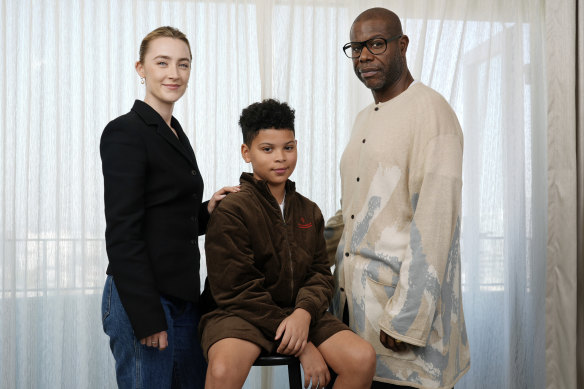
But, in its fictionalised way, Small Axe also looks more widely at actual events and real-life characters from the period, several of whom served as advisers on the episodes about their lives. It’s a trend that has become increasingly prevalent in McQueen’s output. In fact, most of his film and TV productions are firmly grounded in distant or recent history, with Shame and Widows his only completely fictional work.
But nothing in McQueen’s inventory prepares you for the 262-minute documentary Occupied City. In fact, there’s probably never been another film quite like it. Based on Atlas of an Occupied City (Amsterdam 1940-1945), written by his wife, Bianca Stitger, who also directed the extraordinary 69-minute essay-style Three Minutes: A Lengthening (2021, DocPlay), it takes us on a tour of Amsterdam as it is today. The couple knows the city well, as it’s Stitger’s birthplace, and they share a home there as well as in London.
Every address visited by the film has a story to tell, but there’s no historical footage. Although the imagery is firmly fixed in the present, everything is suffused with the past. While the camera surveys present-day buildings, dwellings, streets and parklands, the narrator (who could use some pronunciation lessons) outlines the often-horrific events that occurred at each of the locations during the Nazi Occupation.
The impact is deeply disquieting, McQueen’s methods insisting on the fragility of what we’re seeing, how the seeming order of a place and the lives of people living in it can be so easily shattered. About a third of the way into the film, the camera itself lays siege to the solid, balanced certainty of what we’re seeing. The stability of an elevated forward tracking movement along a city street is abruptly abandoned as a fixed vantage point gives way to disorienting angles until the image is completely upside-down.
You can’t trust what you see, we’re being told. Everything depends on how you’re looking at it. Like Three Minutes: A Lengthening, a shot-by-shot study of a three-minute home movie shot in a small Polish town a year before the Nazi invasion, Occupied City is a potent meditation on both the power of the image and the tragedy of its transience.
Also referencing World War II, but from a very different vantage point, Blitz sets its coming-of-age tale during the height of bombing raids on London by the Luftwaffe. In its Dickensian way, except for the explosions all around, it pivots on the adventures of a mixed-race nine-year-old, George (Elliott Heffernan in a totally winning performance), who’s been separated from his family and is trying to find his way home. In line with the concerns that run throughout McQueen’s work, he’s been thrust into the position of outsider by history and social circumstance.

Steve McQueen (right) with Blitz cast members Saoirse Ronan and Elliott Heffernan.Credit: Chris Pizzello/Invision/AP
The son of a white munitions factory worker (Saiorse Ronan) and a Grenada-born father (C.J. Beckford), he’s evacuated from the London home he shares with his mother and grandfather (former Jam and Style Council lead singer Paul Weller in his screen debut) and sent out of the city to a hoped-for haven. But, despite the risks, he’d rather be with them.
His homeward journey leads him into dark streets, dangerous places and actual historical incidents. As he seeks refuge in subway stations and comfort from strangers, his vulnerability is evident to all. He comes under the wing of several would-be father figures, including a kindly black air-raid warden (Benjamin Clementine) and a wretched Fagin-like scoundrel (Stephen Graham) only too ready to take advantage of him.
Increasingly bewildered but admirably resilient, George finds himself confronted by racism at almost every turn. Mother England might be trying to defend itself against the Nazi threat, but at the same time its residents exhibit some of its repugnant malice. As is the case with his many predecessors in McQueen’s stories, George seems to be confronting overwhelming odds.
Like McQueen himself with his commitment to doing things his way in a professional realm that customarily requires compromise. There’s a considerable irony – and also some reassurance – in the fact that, despite building a career out of his criticisms of his country’s failings, McQueen was awarded with a knighthood in 2020 for his work. And chose to accept it.
Find out the next TV, streaming series and movies to add to your must-sees. Get The Watchlist delivered every Thursday.



